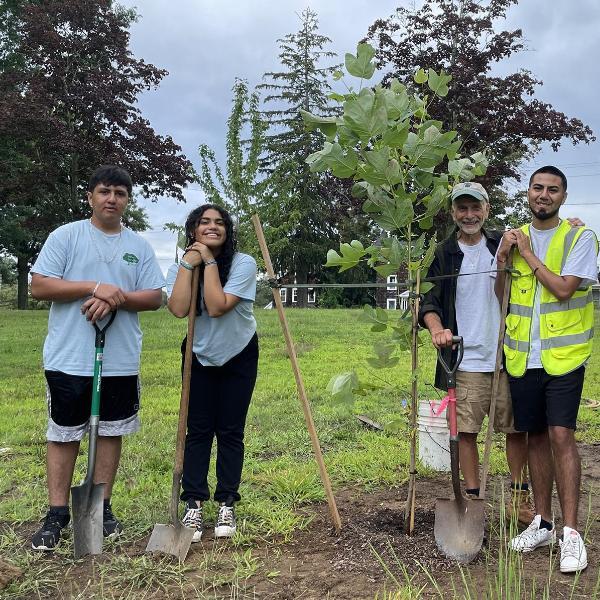SALT Conference 2023
Planting Trees Today for a Greener Future!
Co-Sponsored by Wild Ones Mountain Laurel Chapter
CEU's: Approved for CT DEEP Arborist/Pesticide Program: 4.5 credits in categories 2, 3A,3D

This year's SALT Conference focused on making positive environmental change in our own front and backyards. Held in the Blaustein Humanities Center, this year's attendees gained valuable insight, from four dynamic presenters, about planting native trees to make our landscape more biodiverse and ecologically resilient while supporting social and environmental justice.
We look forward to seeing you at next year's Conference!
2023 Presentations:
Native Trees for Northeast Landscapes
Heather McCargo, Founder, Wild Seed Project
Planting a diversity of native trees into our human dominated landscapes is a powerful act that each of us can take in our communities to support diverse wildlife and buffer local ecosystems as the climate changes. In this presentation Heather will help you think like a forest with its layers of vegetation above ground to the diverse soil community below, and to also understand the importance of planting seed grown trees to support the genetic diversity of our native plants as we bring more of them into our landscapes.
Keystone Trees for Songbird and Pollinator Conservation
Desiree Narango, Conservation Scientist, Vermont Center for Ecostudies
Across every ecosystem, trees vary in the resources they provide and the wildlife they support. In this talk, Desiree will speak about coevolutionary relationships between plants, insects and birds. She'll provide information about which native trees are the 'power plants' that support local food webs based on her research across New England and beyond. Desiree will also speak about steps you can take to conserve biodiversity at home and how your backyard observations can contribute to advancing our understanding of plant-animal interactions.
Forest De-vining
Chris Ozyck, Associate Director, Urban Resources Initiative
Chris has been leading the charge with invasive removal in New Haven and has been involved in native tree plantings in parks. He invites volunteers to identify and prune invasive vines that, when cut back, will promote a healthy forest canopy. This hands-on approach to “de-vining” our trees is intended to empower everyone to help maintain natural areas, public greenspaces and your own backyard.
Leafed Out: Growing Connecticut’s Urban Canopy through Community Leadership
Drew Goldsman, Urban Conservation Director and Tim Clark, Southeastern CT Program Director, The Nature Conservancy in Connecticut
Within the past year alone, over $1.5 billion has been made available to communities to steward and expand their urban forests. The Nature Conservancy and partners will discuss urban forestry initiatives across Connecticut, including in New London and Bridgeport, to engage the audience in a discussion of the future of trees in our communities.
Smaller American Lawns Today, SALT, is a movement introduced in June of 1997 by Dr. William A. Niering, professor of botany at Connecticut College. The SALT mission is to decrease the size of lawns in America by restoring home grounds to more harmonious, productive, ecologically sound and naturalistic landscapes. SALT offers an alternative vision of the monocultured lawn. As Dr. Niering wrote, “There’s nothing wrong with dandelions, there’s something wrong with people.”
Natural beauty can abound in one's own yard. In our annual SALT Conference, participants learn how to cut back on the size of their lawns and also to have beautiful, sustainable, and friendly home grounds as well. Once established, you will never want to go back to a boring, monocultural lawn!
Past SALT Conferences:
2022 - Indigenous Plants: Connecting People and Place
2021 - Awaken a new perspective on the watershed
2020 - no conference
2019 - Creating Edible Gardens for People and Pollinators
2018 - Grow Native: Gardening for the Environment
2017 - A Down to Earth Look at Soils
2016 - Deconstructing the American Landscape
2015 - Kill Your Lawn
2014 - Enhancing Wildlife Habitat: Landscaping for Seasonal Food and Cover with Native Plants with Peter Picone Wildlife Biologist at Connecticut Department of Energy and Environmental Protection
2013 - The Joy of Creating a Beautiful and Bountiful Garden Homeowners often think in terms of planting an ornamental garden and a vegetable garden as two separate endeavors. It is possible, however, to have a garden that is both beautiful and bountiful.
2012 - Gardening in a Changing Environment Experts shared what they are doing now to maintain the sustainability of their land and what they have done when disaster has struck.
2011 - The ABCs of Creating Your Own "Garden of Eden" provided an opportunity for homeowners to learn tips from topnotch speakers in the field of naturalistic landscaping.
2010 - Designing Your Home Grounds for Beauty and Sustainability A seminar on naturalistic landscaping.
2009 - Going Native in New England with featured speaker Douglas W. Tallamy was most informative on the subject of using native plants to promote backyard biodiversity.
2008 - Naturally Beautiful
2007 - Bounty and Beauty in Your Yard
2006 - Inspired by Nature
2005 - User-Friendly Home Landscapes
2004 - Beauty in Biodiversity
2003 - In Harmony with Nature
2002 - Let's Go Natural: A SALT Backyard Landscaping Seminar for Homeowners
SALT meets Wild Ones This article by Kathy T. Dame appeared in the "Wild Ones" Journal, September/October 2008.